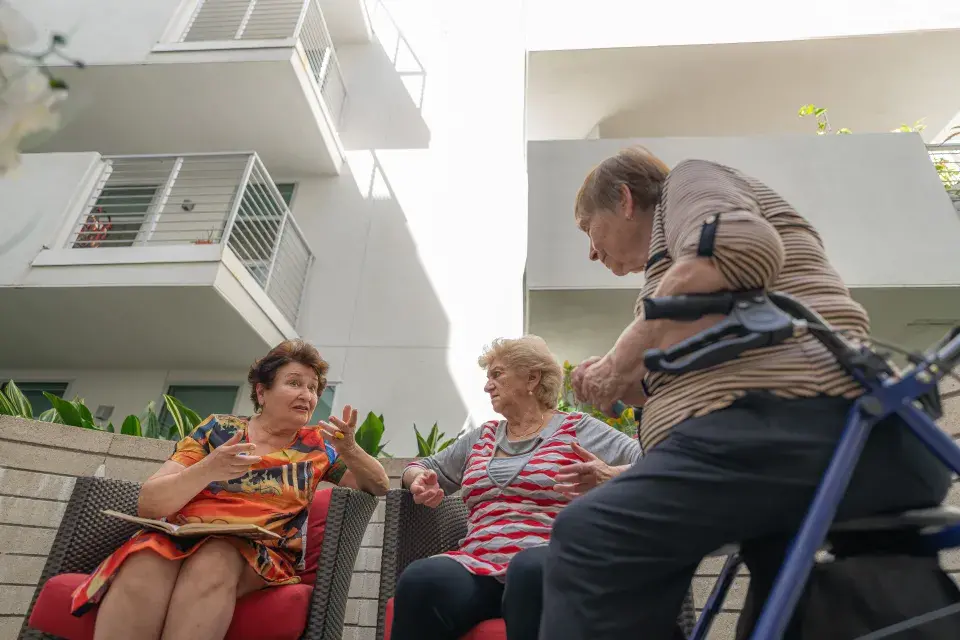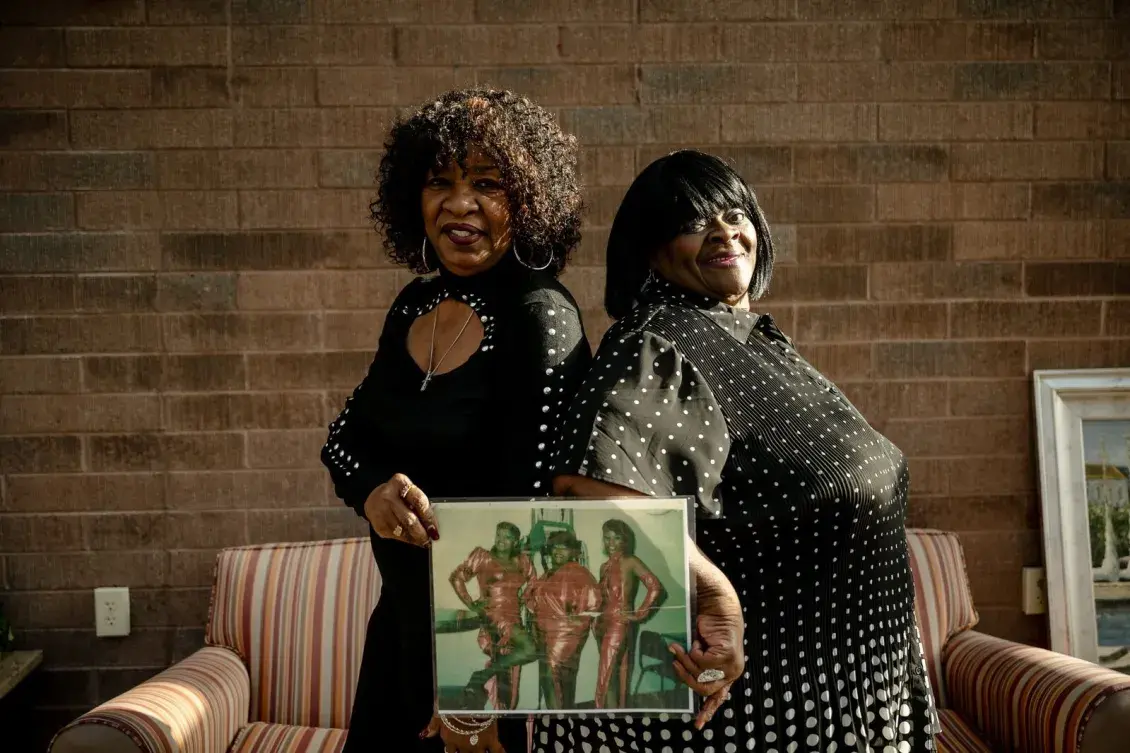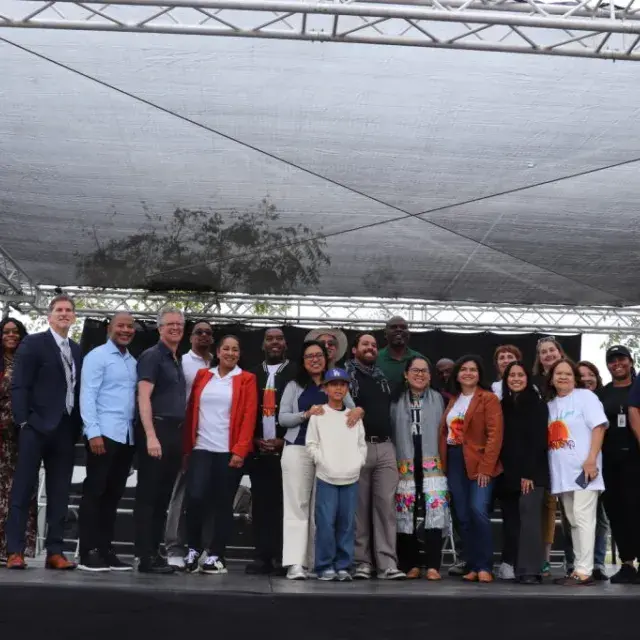Fifty years ago, cousins Diane Heard and Vickie Wilson were professional backup singers, recording with some of Motown’s top acts.
Today, the cousins are still singing together at Detroit’s Van Dyke Center, an affordable housing community for older adults and people with disabilities managed by the Detroit Pastoral Catholic Alliance. Heard, 76, and Wilson, 73, who have lived at Van Dyke Center for years, are active participants in much of the center’s programming, including starring roles in a special “Motown Revue” last year.
Heard and Wilson are fortunate to have secure housing with guaranteed affordability. Increasingly, as baby boomers age and the national housing crisis deepens, there is an acute need for more affordable housing for older adults, including supportive housing. According to the Harvard Joint Housing Center for Housing Studies, the number of cost-burdened older adults is at an all-time high, with 11 million seniors paying more than 30% of their income on housing. Further, 20% of people experiencing homelessness in the United States are older adults, the fastest growing segment of the homeless population. In addition, cuts to other services for older Americans, notably food assistance and healthcare, could potentially force many to make the impossible choice between food and medicine or a roof over their heads.
Public-private investment is key to affordable housing developments like Detroit's Van Dyke Center and creating affordable options for older Americans, like Heard and Wilson.
“Quality, affordable housing is so important for older adults, and we badly need to find a way to build more,” says Anne Sackrison, CEO of CSI Support & Development Services, which has built more than 7,000 units of affordable cooperative housing in four states since its founding in 1945.
Safe housing provides a stable and healthy environment that promotes improved physical and mental health outcomes for older adults. Housing touches upon so many aspects of life.
Anne Sackrison, CEO of CSI Support & Development Services
Impact of the One Big Beautiful Bill on Senior Housing

The Low-Income Housing Tax Credit, also known as the Housing Credit and LIHTC, is the number one source of financing for the construction and preservation of affordable rental housing, including senior housing. Since it was created by the Tax Reform Action of 1986, LIHTC has created or preserved around four million affordable homes and has been the cornerstone of affordable senior housing for decades. Through 2022, 36.7% of households living in Housing Credit-financed properties included at least one adult age 62 or older.
Prior to the 1986 tax reform law, most affordable housing was publicly funded, owned, and operated. LIHTC launched a new model of financing affordable housing through public-private partnerships, said Ayrianne Parks, senior director for policy advocacy at Enterprise.
In July, President Donald Trump signed the budget reconciliation bill known as the One Big Beautiful Bill Act (OBBBA), which included the largest expansion of the Housing Credit in 25 years, into law. Advocates anticipate that the LIHTC provisions in OBBBA will finance an additional 1.2 million affordable homes nationwide over the next 10 years.
LIHTC’s expansion is critical for addressing the rising number of seniors who are experiencing homelessness, an estimated 146,000 in the United States last year. Living unhoused or in shelters is difficult for anyone, but can be especially challenging for seniors, who may have mobility issues, struggle to climb into bunk beds, or need assistance with daily living activities that shelters simply don’t provide.
This historic expansion of the Low-Income Housing Tax Credit is a critical step forward in addressing the shortage of 7.1 million rental homes that are affordable and available to renters with extremely low incomes. The Housing Credit ensures Enterprise and partners across the country can continue building and preserving homes for those who need them most, including older adults who want to age in place.
Ayrianne parks, Enterprise senior director for policy advocacy
Parks notes that even with LIHTC’s expansion, the success of many investments depends on other critical federal resources, including programs like HUD’s HOME Program, vouchers, and many other appropriated sources of gap financing.
Offset by Cuts
Other elements of the budget reconciliation bill could imperil the well-being of older Americans. The steep cuts to SNAP and Medicaid will put a greater burden on states and the nonprofits serving seniors to make up the difference.
“The good news about LIHTC’s expansion is offset by some really bad things for low-income individuals, especially seniors,” says Sackrison. Based on Congressional Budget Office (CBO) estimates, the reconciliation bill will cut nearly $300 billion from the Supplemental Nutrition Assistance Program (SNAP) through 2034. An estimated four million people, including children, seniors, and individuals with disabilities, will have their food assistance reduced or terminated. Cuts to Medicaid and Affordable Care Act (ACA) funding could cause nearly 12 million people to lose their health insurance by 2034, according to a CBO analysis.
Many older adults’ housing subsidies are also in jeopardy, especially as the White House and Republican and Democratic congressional leaders failed to reach an agreement to extend government funding, resulting in a shutdown of most of the federal government on October 1. In the balance is next year’s appropriation for HUD programs, such as Section 8 Housing Choice Voucher rental assistance and Section 202 Supportive Housing for Seniors, which supplies direct funds and loans to nonprofits that provide supportive services for older adults.
The Senate Appropriations Committee approved its HUD fiscal year 2026 (FY26) spending bill proposal in July, including $972 million for Section 202 Housing for the Elderly, a $40 million (4%) increase from FY25 and $12 million (2%) above the House, rejecting many of the drastic cuts and proposals to consolidate rental assistance and homelessness programs that were included in the President’s Budget Request, and avoiding many of the cuts that were proposed in the House’s version of the same bill.
As Enterprise and its partners await final appropriations decisions, some initiatives can serve as potential shock absorbers. As a community development financial institution (CDFI), Enterprise Community Loan Fund brings together mission-driven investors to provide affordable loans and investments to spur affordable housing development, including for seniors. Over the last five years, the fund has provided $73.7 million in financing to create or preserve nearly 3,000 units of senior housing, including a 63-unit development in New Orleans and a 103-unit community village in San Jose.
“Demand for senior housing is fast outpacing supply,” said Anna Smukowski, Enterprise’s managing director of impact investing. “Enterprise Community Loan Fund is focused on financing projects that respond to this growing need: homes that are affordable, accessible, and offer services that support the stability and dignity of people as they age—particularly for residents on fixed incomes.”
Thome Aging Well Program Grants
Alongside capital and policy work in support of older adults, programs that help seniors with lower incomes age in place are also critical. Enterprise’s Thome Aging Well program has allocated $9.5 million in funding to 38 organizations that provide direct services for seniors living in Michigan and Maryland. Another $10 million has been awarded to 17 organizations to spur innovation in the field.
Since its inception in 2022, these grants have provided services for 12,000 seniors. Included among these services are those that help older adults remain in their single-family homes. Multiple grantees offer home repair and enhancements, such as installing ramps, lower counters, and other needed modifications. Others offer legal and estate planning services, such as avoiding probate and untangling titles, to preserve and promote generational wealth.
If someone’s living in their own home, we want them to be able to stay there and age safely and securely in their community, thus enhancing their quality of life. This also reduces pressure on a system that is already crunched and ensures that wealth is passed to the next generation.
Dr. Stephany De Scisciolo, Enterprise’s Vice President for Impact, Evaluation, and Population Health
What’s Next?
As Congress reconciles its priorities with the president’s budget proposal, housing and senior advocates continue to push for affordable housing resources.
In the meantime, Detroit residents Heard and Wilson say they are focusing on strengthening their own community day by day, as they hold out hope that support for senior housing will remain a priority.
“Our next goal is to get a karaoke night going, then Diane and I can see who else has talent in this building,” Wilson says.
Jackie Krentzman is a San Francisco Bay Area-based writer focused on housing and homelessness, environment and climate, economic development, and women's leadership.


